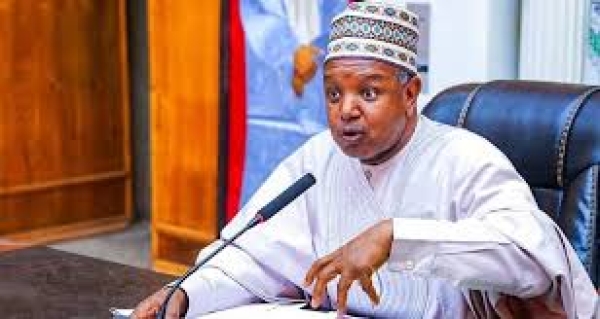The Minister of Budget and Economic Planning, Atiku Bagudu, disclosed this on Friday during a meeting with the Senate Committee on Appropriations, chaired by Olamilekan Adeola.
A report by Saturday PUNCH has shown that the Federal Government plans to allocate N3 trillion towards the implementation of the new minimum wage and the payment of pensions and gratuities.
The Minister of Budget and Economic Planning, Atiku Bagudu, disclosed this on Friday during a meeting with the Senate Committee on Appropriations, chaired by Olamilekan Adeola.
The minister presented the general principles of the newly amended 2024 budget to the committee at the meeting.
Recall that President Bola Tinubu had, after a meeting with the leadership of the Nigeria Labour Congress and the Trade Union Congress on Thursday, approved a new minimum wage of N70,000 for Nigerian workers. The president also pledged to review the national minimum wage law every three years.
The National Assembly, in both chambers, had on Wednesday passed for first and second readings an amendment of N6.2tn to the 2024 budget, increasing the budget size to N33.7tn.
In a letter to the Senate, read in plenary by the Senate President, Godswill Akpabio, Tinubu sought the withdrawal of N3.2tn from the Consolidated Revenue Fund for capital expenditure. Additionally, he requested another N3tn for additional recurrent expenditure for the year ending on December 31, 2024.
For expeditious consideration, the Senate gave the requests presented as executive bills, first and second readings, and mandated its committees on Appropriations and Finance to inject more legislative inputs and report back within a week. In his lead debate on the Appropriation Amendment Bill, the Senate Leader, Opeyemi Bamidele, said the amendment sought to authorise the issuance of N3.2tn for capital expenditure and N3tn for recurrent expenditure from the consolidated fund. He explained that this would help fund capital infrastructure development, education, healthcare access, and public welfare initiatives.
Senator Adamu Aliero supported the bills, citing the need to fund the expected minimum wage for workers. Senator Adams Oshiomhole emphasised the necessity of funding the personnel costs arising from the minimum wage adjustment. He stressed that the increase in personnel expenditure must be legally backed to prevent financial shortfalls.
During the Friday meeting with the Senate Committee on Appropriations, the minister noted that the new budget additions would not be funded by loans but by an already reserved profit.
Bagudu explained that priorities were given to projects that would open up roads for investments and emergencies, while other road projects would be addressed in subsequent batches. He highlighted the country’s historical underinvestment in infrastructure as a root cause of recent problems and commended President Tinubu for addressing the infrastructure deficit.
Bagudu assured that the Federal Executive Council would continue to approve funding for other road projects as funds become available. He provided a sectoral overview of the N3.2tn for the Renewed Hope Infrastructure Projects and the N3tn increase in the recurrent component of the budget.
Senator Adeola affirmed the government’s capacity to finance the 2024 budget and requested a detailed breakdown of the N6.2tn approval.
This breakdown, to be submitted next week, will be debated by both chambers of the National Assembly. Senate Spokesperson, Senator Yemi Adaramodu, confirmed that ministries, departments, and agencies would defend their budget allocations before the relevant Senate committees.
The recurrent budget of N3tn will fund the minimum wage, pensions, and gratuities, while the capital component of N3.2tn will augment existing road projects on state and federal routes, including coastal roads, the Sokoto-Badagry road, railway construction, and dam irrigation.
